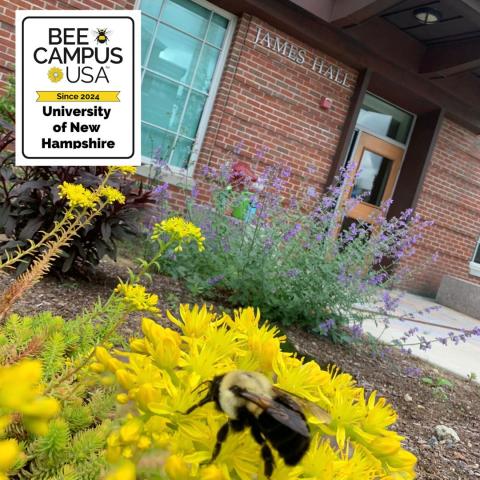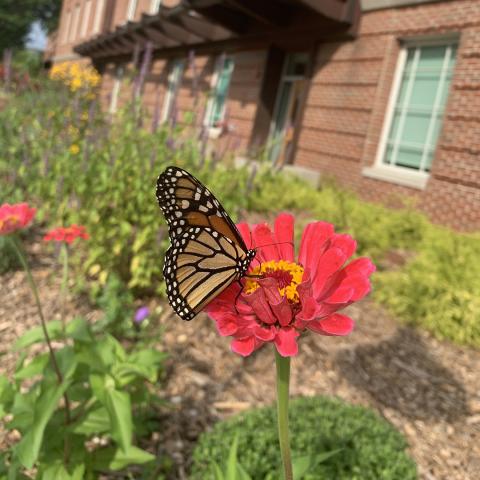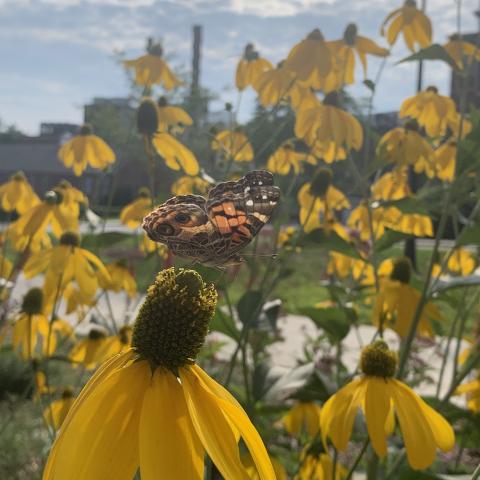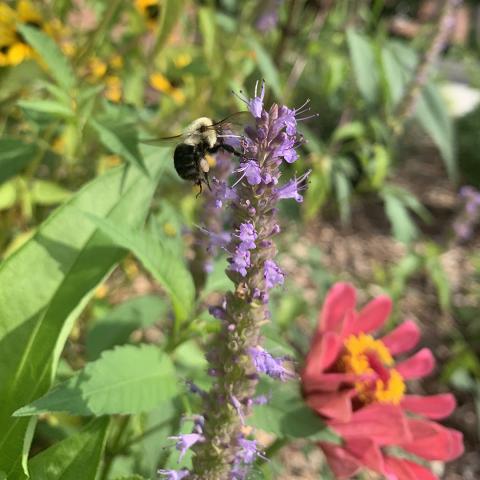The path to UNH's new Bee Campus Certification

For the past four years, the UNH Sustainability Institute (SI) has been working with Grounds and Events, Campus Planning, Student Government, and other entities to become Bee Campus certified. This spring we finally received our official certification!
Improving our pollinator landscape is a long-term goal for both SI and the university as a whole. Our Bee Campus certification shows our campus-wide commitment to this initiative.
Dedicated student ecosystems interns have been leading the progress on this project and in 2023, the James Hall garden was established as our first pollinator garden, one of many to come. Officially recognized as a pollinator habitat by UNH Extension, this garden focuses on providing food and habitat for pollinators safe from harmful pesticides. The summer blooms in this garden are thriving right now with pollinators all over them.
What is Bee Campus certification?
Bee Campus USA is an initiative through the Xerces society committed to supporting native pollinators on campuses across the US. This includes planting native plants, providing nest habitat, and reducing pesticide use. In addition to the enhancement of pollinator habitat, education and engagement of students, staff, and faculty is required for certification. This initiative serves to benefit pollinator conservation, as well as the community they are in.
Why is pollinator conservation so important?

Pollinators are an integral piece to multiple food systems. They consume nectar from flowers and pollinate a majority of our flowering plants. These include crops worldwide that feed humans and animals. Pollinators and their larvae are also eaten by birds and other organisms, further servicing a diverse food web. Pollinators directly contribute to our food systems, promote biodiversity, and create ecosystem resilience.
These benefits are possible because of the coevolution of pollinators and pollen-producing plants. Due to this unique system, there are many plants that are exclusively pollinated by certain pollinator species, and certain pollinator species that cannot survive without certain plant species.
Bee Campus and UNH’s pollinator gardens are focused on providing habitat and food for the species native to our area to promote local biodiversity. These specialized relationships are being threatened by the urban landscape, which is why it is so important that we integrate pollinator conservation into our campus landscape.
How is this a bigger part of UNH?

As a complement to the Campus Master Plan, the Ecosystem Task Force developed the Landscape Master Plan with sustainability as a major focus. The most recent version was created in 2021, with explicit mention of supporting biodiversity: "Gardens offer opportunity to reinforce the region’s unique sense of place by creating pockets of natural habitat that enhance biodiversity on campus. When developing such spaces, thought should be given to how the garden can reinforce the natural organization of the campus and help restore the fragmented landscape". The Watershed-Ecosystem Task Force is the steward of the Landscape Master Plan.
Also part of this plan is a conscious acknowledgment of the ecosystem through the transition towards organic and integrated pest management (IPM) practices. Our pollinator gardens are fully pesticide and herbicide-free and lawns on campus are managed without harmful pesticides by our committed Grounds and Events team.
UNH is working hard to make our campus landscape uphold the values of the university through both education and real-time implementation.
What is the Sustainability Institute’s role?

The Sustainability Institute has been a driving force behind the pollinator initiative creating opportunities for biodiversity to flourish and for students to have active engagement in sustainability on campus. The SI works with a group of student interns every year who work on independent and collaborative projects across campus. There have been a number of Ecosystem and Biodiversity interns over the years working on hands-on, cross-disciplinary projects – including the pollinator gardens. The James Hall garden took years to plan, plant, and grow, with constant maintenance by interns and staff at the SI. This summer, full-time intern Emily Abrusci and Sustainability Innovation Fellow Kailei Wedge '24 are working with Chadd Hippensteel from Grounds and Events on Sustainable Landscape Design to implement two new pollinator gardens in the fall.
How can you get involved?
We are always looking for volunteers to help plant and maintain our pollinator gardens. Contact Emily at eba1009@usnh.edu to learn more and look on UNH serves for volunteer opportunities.
We would like to acknowledge the past ecosystems interns: Brooke Healy 23’, Ila Bartenstein 24’, and Andrew Rickets ‘26 and Sustainability Institute staff and the continued collaboration with Grounds and Events, Campus Planning, and Campus Stewardship.
